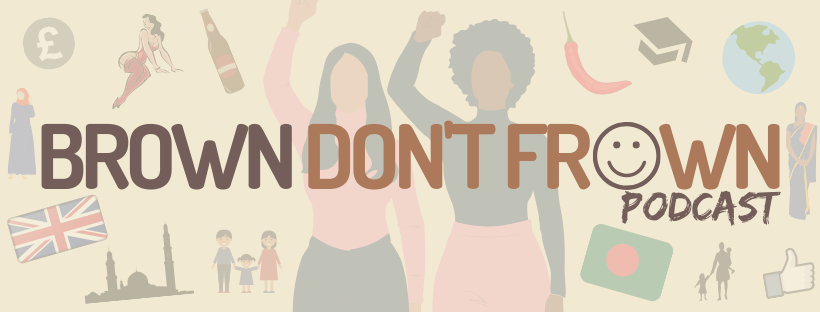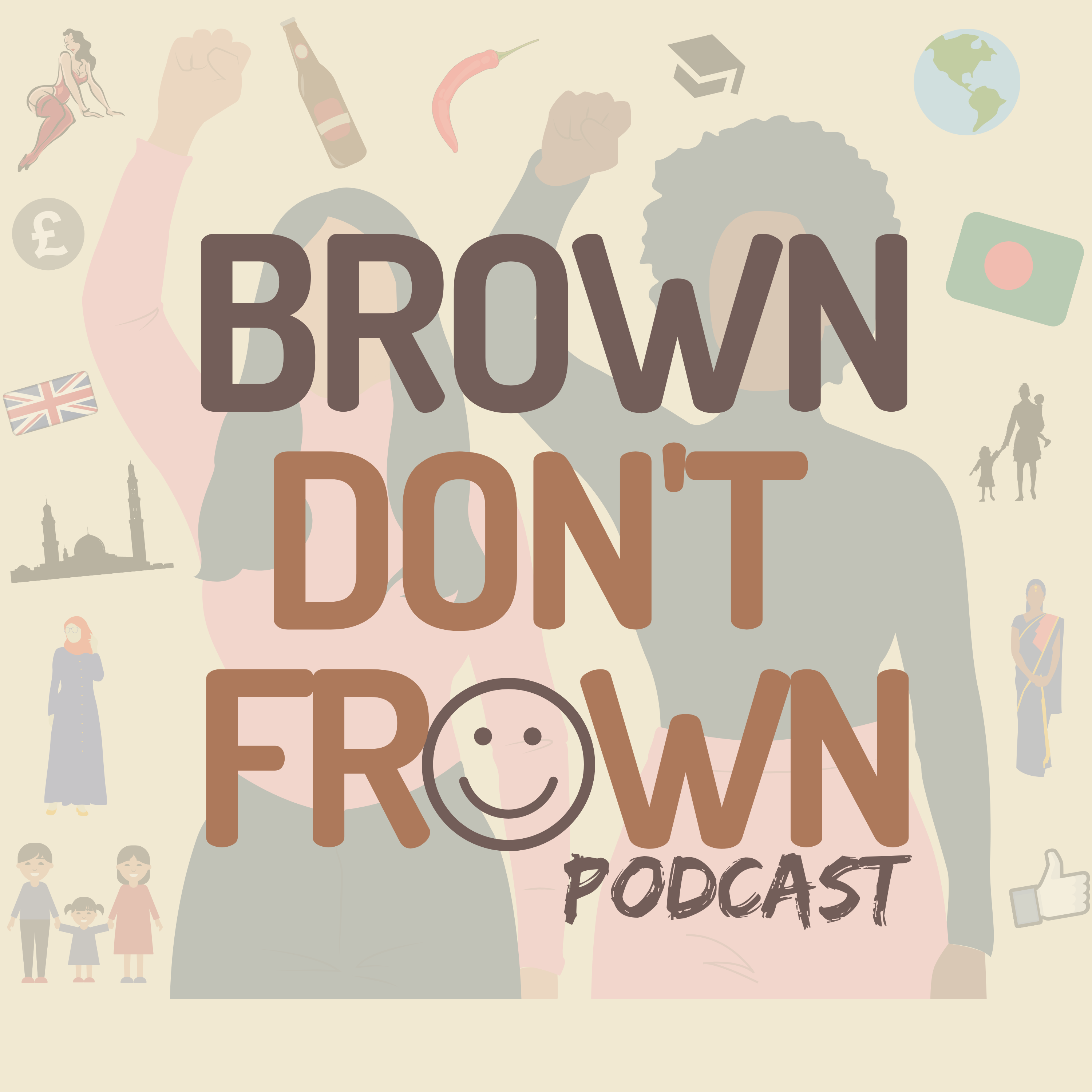
Brown Don't Frown was borne out of a personal journey with womanhood. As a British Bangladeshi, navigating mainstream Feminism often felt exclusionary to me because it didn’t seem to value the experiences or views which shaped my grandmother’s, aunts’, mother’s or friends’ lives. Through this podcast, we seek to build a more inclusive discourse, which breaks down presumptions about different cultures, and shines a positive light on the stories of underrepresented women. Featuring new guest(s) from different walks of life in each episode, Brown Don’t Frown seeks to engage ordinary women and facilitate openness towards entirely new perspectives. It hopes to spark honest and meaningful conversations about intersectional feminist themes in contemporary society with the acknowledgement that our views are shaped by our cultural, racial, religious, social and political experiences. Whether it's discussing society's preconceptions about the Hijab with a British-born Jamaican Muslim woman or examining the impact of gendered expectations on our ability to grieve on our own terms, we hope listeners finish each episode feeling more rounded than they did before. Follow us on: Instagram: https://www.instagram.com/browndontfrownpodcast/ Twitter: https://twitter.com/bdfpodcast?lang=en Facebook: https://www.facebook.com/browndontfrownpodcast LinkedIn: https://www.linkedin.com/company/browndontfrownpodcast
Episodes
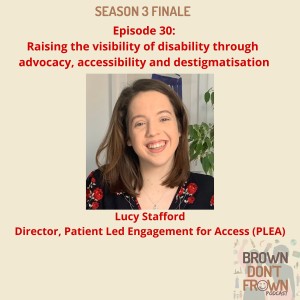
Sunday Feb 14, 2021
Sunday Feb 14, 2021
“Disabled people are infantilised, sensationalised or they’re just not believed.”
We end Season 3 on a thought-provoking note and I’m pleased to welcome Lucy Stafford to the show. Lucy is the Director of Patient Led Engagement for Access (PLEA), a non-profit which advocates for access to medical cannabis through mainstream healthcare. She speaks about her experience as a long-term patient of Ehlers-Danlos syndrome, a rare, life-long genetic disorder which can cause debilitating effects. Drawing from her own experiences, she explains how we can facilitate greater accessibility for those with disabilities. As an able-bodied person, the discussion makes me confront some of my own ignorances about disability.
To cope with her long-term pain and the effects of surgery, Lucy was prescribed strong opioids for a long time, until she came across medical cannabis. She tells us about her journey with pain management and how her experience with medical cannabis has differed from taking traditional prescribed pain medication. She has become an advocate for decriminalising medical cannabis for those with serious medical conditions. She talks about her work with PLEA and a new initiative called ‘Project 21.’ As someone whose life has changed for the better from medicating with Cannabis, I ask her what she would say to someone in a similar position to herself, who might be experiencing serious pain and is looking for alternatives to opioids or surgery, but is worried about the stigma attached to cannabis.
The pandemic has accelerated remote engagement, whether working, studying or socialising, and makes participation much more accessible. We think about what that might be like post-pandemic. We end with Lucy talking about the most empowering aspects of her advocacy work so far and what she has learned from it.
You can find out more about Lucy and PLEA at:
https://www.pleacommunity.org.uk/executivecommittee/lucy
You can also reach her on Instagram: @lucystaffie and Twitter: @lucystaffie.
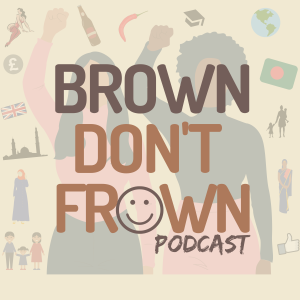
Sunday Jan 31, 2021
Season 3: Ep 29 - Why Queer South Asian storytelling matters
Sunday Jan 31, 2021
Sunday Jan 31, 2021
Today we’re joined by Adiba Jaigirdar, author of Young Adult fiction books The Henna Wars, and Hani and Ishu’s Guide to Fake Dating. She shares with us her journey from Bangladesh, to Saudi Arabia to Ireland, her sense of identity and belonging, and her motivations for writing.
As a Queer Brown author, whose books are about Queer Brown girls, I ask whether she had any challenges with finding an agent who she could trust to represent her and her written work. Adiba talks about personal influences and experiences which inspired the main characters in her books and what she learned about herself when bringing her characters to life. The main character, Nishat in Henna Wars, stays true to herself in the face of resentment from her family after she comes out as a Lesbian and Adiba explains what she hopes Queer teens and young Women of Colour will take away from such themes in the book.
Adiba also tells us a bit about her second novel, Hani and Ishu's Guide to Fake Dating, which comes out this summer. As a newly published author, Adiba shares some advice for aspiring Queer novelists from the South Asian, and particularly Bangladeshi, diasporas. Finally, we leave you with our gripes about mainstream feminism and thoughts on reclaiming and reframing its narrative to be inclusive of Muslim women, the Queer space, and especially Queer Women of Colour.
You can follow Adiba on Twitter @adiba_j and Instagram @dibs_j.

Sunday Jan 17, 2021
Sunday Jan 17, 2021
Our first guest of 2021 is Sangeeta Pillai. She is the founder of Masala Podcast and Soul Sutras, a feminist platform tackling taboos in South Asian culture. South Asia is made up of diverse countries, ethnicities, cultures, faiths, and traditions. One thing that we share universally across the continent and beyond, is patriarchy. It forms a part and parcel of our social fabric. As a Keralan born Indian having spent a large part of her life in India, and now in the UK, Sangeeta talks about what intersectionality means to her and the patriarchal values which hold all women back universally.
Sangeeta has spoken openly about sexual empowerment, and while in Britain and in much of the West, sexual confidence has been reclaimed by women, the trajectory is not quite the same in South Asian countries. There is a correlation between inequality and lack of access to sexual and reproductive health facilities, which is often a barrier to sexual empowerment. By contrast, the conservative arm of feminism, both Western and Eastern, might argue the other way, and interpret sexual freedom as promiscuity and we reflect on these contrasting attitudes.
Globally, South Asian women have made significant inroads in industries including tech, medicine, scientific research and film-making. While that’s progress, we’ve also seen the personification of Indian “aunties” in mainstream television, with shows like Indian Matchmaker and Never Have I Ever, which highlight examples of internalised patriarchy. Societal structures shape our way of thinking. South Asian cultures centre around multi-generational extended families and strong communities, while in the West, the focus is on individualism and self-sufficiency. These structures still dominate women’s positioning, especially because women were designated home-makers up until relatively recently. We reflect on the impact of these structures on women and how they have evolved over time.
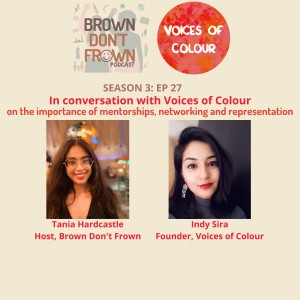
Sunday Dec 13, 2020
Sunday Dec 13, 2020
2020 has shown us that a world of remote working is entirely possible. But can mentorships, networking and representation be as effective over a screen?
We're excited to have Indy Sira, founder of Voices of Colour, a community action and leadership development programme for South Asian girls aged 15 to 18. The programme seeks to empower young girls by equipping them with the tools to create meaningful change within their communities and providing them with female role models through mentorships.
As someone who works at the forefront of securing mentorships for young girls, I ask Indy about her observations in terms of what they are looking for in a mentor, and whether there are particular areas which the traditional education system, parents or friends cannot provide. If there is one piece of career advice we could give to our younger selves, it might be to network more, but how accessible is it?
Representation has changed rapidly in recent years, but growing up, I remember people from mainstream television, and certain professions like politicians, lawyers, teachers, doctors didn’t always speak, act or look like me. 36 of the 1000 most powerful people in Britain are from ethnic minorities and just 0.7% of them are BAME women and this lack of representation can have an impact on aspirations. When we see people in high places who don’t resemble us, it’s hard to feel like we belong, let alone feel good enough to pursue a career in these areas. We also discuss the role of schools, local councils and youth programmes in widening access to opportunities.
You can find Voices of Colour and Indy on Twitter @VoicesofColour1, @IndySira1.
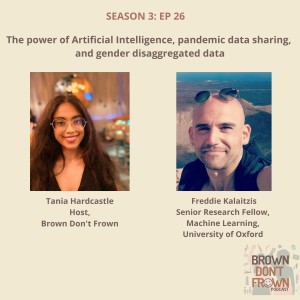
Sunday Nov 29, 2020
Sunday Nov 29, 2020
*Apologies in advance for the slightly off sound quality; we hope you still find the content meaningful.*
What is Artificial Intelligence? What role can it play in ensuring information is factually correct (especially during a pandemic) and that data is gender disaggregated? Today I’m joined by our first honorary male guest, Freddie Kalaitzis, Senior Research Fellow in Machine Learning at the University of Oxford. We know that AI is modelled on human behaviour, and given that humans are innately biased, can we trust AI to be unbiased and neutral?
Freddie also talks about his work with Amnesty International on ‘Troll Patrol', which investigated the extent of abuse against women online. One statistic which stood out was that Women of Colour were 34% more likely to be mentioned in abusive tweets than White women and that Black women were particularly affected, being 84% more likely than white women to be mentioned in abusive tweets.
Globally, Public Health policies have not addressed the gendered impacts of pandemics. Campaigners have argued that this research gap is caused by a lack of gender disaggregated data. Emerging evidence suggests that more men are dying, potentially due to gendered immunological or environmental differences, such as exposure to pollutants from working outside or smoking. 89% of nurses in the UK are women, emphasising the gendered nature of the healthcare workforce and the risks that women face. I ask Freddie if AI can drive information gathering techniques which simplify and enable sex disaggregated data to be collected and what solutions AI might provide in response to COVID-19. At a time when we are saturated with news and information at our fingertips, AI could play a crucial role in preventing misinformation. Finally, Freddie reminds us why we should be mindful that correlation doesn’t always mean causation.
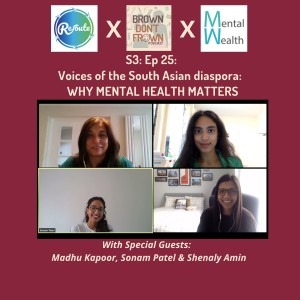
Sunday Nov 15, 2020
Sunday Nov 15, 2020
In this candid episode, I am joined by Madhu Kapoor and Shenaly Amin from Mental Wealth, a Mental Health peer support group for South Asians aged 30+, and Sonam Patel of its sister organisation, Reroute, for younger South Asians. We explore Mental Health through the themes of migration, awareness and accessibility, cultural stigma and familial expectations.
South Asian communities are more likely to experience poverty, have fewer educational and work opportunities, and experience language and other communication barriers by virtue of integrational struggles. These social, economic, and cultural struggles can heighten mental health risks. Improving uptake of mental health services by ethnic minorities is a longstanding challenge for public health providers and we look at how health and social policies should factor these variables into their objectives. Reflecting on our personal mental health experiences, we recognise the importance of raising awareness and making mental health services more accessible for our communities.
Depression and mental illness are rarely spoken about in South Asian communities, and those who do speak about them can feel worn down by the judgment of others. Nonetheless, the younger generation have made significant inroads to help us collectively ‘unlearn’ these traditions and outlooks and Mental Wealth has revealed that attitudes among older generations are actually shifting. Particularly, with women, there’s a strong link between mental health and hormonal changes. For example, the menopause can have a series of mental impacts, such as anxiety, low self-esteem, and emotional distress, alongside the physical effects. Speaking from her own experience, Madhu explains why we need to show more compassion and openness towards it. We also consider the impact of intergenerational families on women’s wellbeing and the negative mental health consequences of idolising the “self-sacrificial” woman.
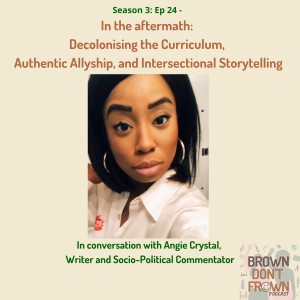
Saturday Oct 31, 2020
Saturday Oct 31, 2020
In this raw, frank, and necessary episode, writer Angie Crystal talks about the incoming societal change driven by the resurgence of Black Lives Matter. Five months on from the killing of George Floyd, we discuss the symbolism of BLM as a movement.
We talk about intersectional story-telling, and I ask Angie Crystal whether, as a Black British woman, she feels any dissonance between #BlackLivesMatter and mainstream Feminism. She feels that there is a lack of intersectionality, because colour is removed from the narrative, which disproportionately affects Black women due to the compounding of gender, race, colourism and history. For example, the Gender Pay Gap has been widely publicised, but the Ethnicity Pay Gap, between White men and Black women hasn’t received the same traction. We look at the shortcomings of the #MeToo movement, the distinction between performative allyship and true allyship, and the importance of acknowledging (and reckoning with) one’s own privilege.
We ask: will the UK ever get behind its colonial past? Angie Crystal explains why there needs to be an open and honest conversation around our roots of wealth. Slave-owner compensation is archived in British history. In the same vein, are reparations justifiable, or would they undermine the empowerment and agency of Black people and indict them into a dark past?
We discuss how decolonising the curriculum in schools is fundamental to curbing denialism and consider how it can be embedded at an institutional level. We explore the correlation between economic inequality and systemic racism, both in the UK and the US. With this example, we question whether challenging racism exclusively through the lens of ideology or identity politics, rather than through systemic change can be counterproductive.
We end on a deeply sombre yet poignantly brave note, as Angie Crystal recounts her father being killed while living and working in the US while she, with her mother and sister, were in the UK. She reflects on the ghost of things unsaid and her sense of displacement at the unsolved mystery, and still no closure.
In the aftermath of George Floyd’s killing, we must unlearn the desensitisation of trauma and instant gratification we've been taught by social media, and learn to live with greater purpose.
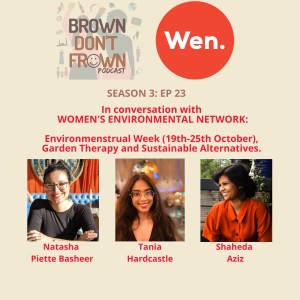
Sunday Oct 18, 2020
Sunday Oct 18, 2020
The Women’s Environmental Network seeks to enable equality through the intersection of gender and the environment. In conversation with Natasha Piette-Basheer and Shaheda Aziz, I ask: firstly, how do we achieve environmental justice? And secondly, how do we make it intersectional?
Natasha tells me how WEN amplifies the conversation around reusables and plastic free period products. Their “Environmenstrual Week” campaign runs from 19 - 25 October. “It’s about making people feel empowered to make informed choices about menstruation products” she says. Large companies currently dominate the market share in period products. During my recent trip to the supermarket, the sanitary products aisle was dominated by popular brand names, whereas I don’t think I even spotted reusables, for example, moon cups, unless I looked at the bottom. I ask if there are any cross-organisational initiatives that WEN partners with to raise the visibility of toxicity-free reusables. In response, WEN is lobbying big manufacturers to include reusables in their business model and has developed a helpful toolkit and template letter for consumers to ask for greater transparency from retailers and manufacturers.
Shaheda speaks passionately about the ‘Soil Sisters’ project, which brings together domestic violence sufferers across women’s refuges in East London through weekly therapeutic gardening sessions. She visits their homes and facilitates sessions comprising horticulture, as well as cooking, arts and crafts. A wholesome example of ecofeminism in action, Shaheda explains how she entered this space with the utmost respect for these women, offering healing through garden therapy, but with realistic expectations from the outset. In doing so, she was able to form organic friendships with the women, which reinforced a sense of collectivism and sisterhood, and created an environment where women could be happy just being themselves.
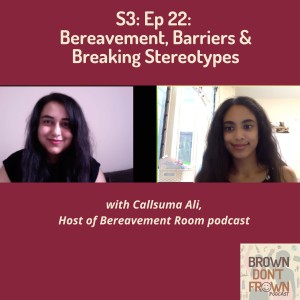
Sunday Oct 11, 2020
Season 3: Ep 22 - Bereavement, Barriers & Breaking Stereotypes
Sunday Oct 11, 2020
Sunday Oct 11, 2020
When you think of bereavement, what three words spring to your mind?
I’m joined by Callsuma Ali, host of Bereavement Room podcast. We look at the positives and negatives of how bereavement is addressed within the South Asian, and particularly British Bangladeshi community. Drawing from our own bereavement experiences, we both share our positive sentiments of the sense of togetherness and its symbolism through food. By contrast, we recognise the double standards which often prevent women from attending funerals, coloured by the stereotype that they grieve too hysterically. We examine its historical basis, both from a cultural and religious perspective.
Counselling and psychotherapy are rarely spoken about among ethnic minorities due to the stigma of publicising vulnerability. Given her background in counselling and bereavement support, I ask Callsuma about whether attitudes to needing ‘help’ are shifting.
There are assumptions around South Asian family dynamics, including intergenerational living, with younger family members helping their elderly parents. This can be a barrier to accessing external help, for example a visiting nurse, home care assistance or hospice care. We look at how to make our voices heard so that such misconceptions no longer continue.
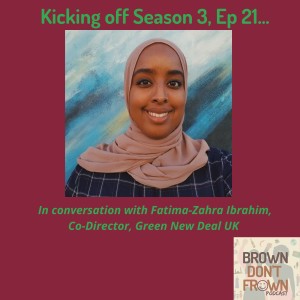
Sunday Sep 27, 2020
Season 3: Ep 21 - Climate Change: an inconvenient reality
Sunday Sep 27, 2020
Sunday Sep 27, 2020
We begin Season 3 with Climate Change Activist and Co-Executive Director of Green New Deal UK, Fatima-Zahra Ibrahim. No previous war or recession has resulted in such a rapid decline in emissions as we’ve seen during COVID-19. We therefore ask: is it a real catalyst for addressing climate change?
We explore Bangladesh as a case study for environmental migration, namely how Mongla, a port town on its south coast is an attractive alternative to an overcrowded and environmentally endangered Dhaka.
We talk about optics, the polarised public perception of Extinction Rebellion, and how impactful activist campaigns are in engendering real change. We also consider how we can address the lack of representation and diversity in climate change activism. I invite Fatima to talk more about Green New Deal UK, and whether a Green New Deal is indeed compatible with the dominant political and economic system of our time: Capitalism. We discuss how environmental policies can be embedded within strategies to address the pandemic-induced economic crisis and wider inequality.
Finally, we look at the steps we can take, on an individual scale, to be more climate conscious.
